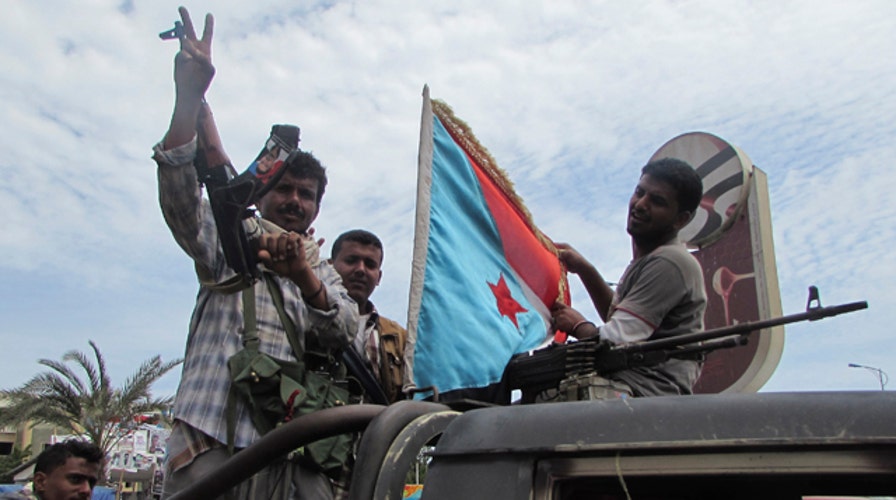United Nations envoy: Yemen set to erupt into civil war
U.S. pulls remaining Special Forces out of Yemen
The Yemeni foreign minister is asking several Gulf Arab neighbors for military intervention to stop territorial advances by Houthi fighters in his embattled country, after the U.N. special envoy for Yemen warned the U.N. Security Council that events appear to be leading the country "to the edge of civil war."
The Houthi rebels opposed to President Abd-Rabbu Mansour Hadi are threatening the country’s security, Yemeni foreign minister Riyadh Yaseen suggested Monday.
"They're expanding in territory, occupying airports and cities, attacking Aden with planes, detaining whom they please, threatening and gathering their forces," Yaseen told Al Jazeera TV.
"We have expressed to the Gulf Cooperation Council, the United Nations as well as the international community that there should be a no-fly zone, and the use of military aircraft should be prevented at the airports controlled by the Houthis," Yaseen told the al-Sharq al-Awsat newspaper, Reuters reported.
Gulf Cooperation Council members include Saudi Arabia, Kuwait, the United Arab Emirates, Oman, Qatar and Bahrain.
Yaseen made his plea after U.N. special envoy for Yemen Jamal Benomar warned an emergency meeting of the U.N. Security Council Sunday that events were escalating rapidly and urged all parties to step back from the brink and resolve the conflict peacefully.
Benomar stressed repeatedly in a video briefing from Qatar that "peaceful dialogue is the only option we have."
That view was echoed by the Security Council in a presidential statement which reaffirmed the readiness of the U.N.'s most powerful body to take "further measures" against any party impeding the road to peace in Yemen. That could mean new sanctions, or possibly other actions.
Benomar said "it would be an illusion" to think that Houthi Shiite rebels — who control the capital Sanaa, much of the north, and are moving further south backed by some members of Yemen's armed forces — could succeed in taking control of the entire country.
On Sunday, the Houthis seized Taiz, Yemen's third-largest city.
"It would be equally false," Benomar said, to think that President Hadi, who fled earlier this month to the southern city of Aden — the country's economic hub — could assemble sufficient forces "to liberate the country from the Houthis."
He warned that any party that pushes the country in either direction "would be inviting a protracted conflict in the vein of an Iraq, Syria, Libya combined scenario."
Yemen's turmoil and political crisis has deepened since the Houthis seized Sanaa in September and put Hadi under house arrest and eventually dissolved the country's parliament. The country's Al Qaeda branch, considered by the U.S. the terror network's most dangerous offshoot, has stepped up attacks against the Shiite rebels.
The Houthis newly announced move to take over the entire country follows the suicide bombings of a pair of mosques in Sanaa that killed 137 people Friday, and were claimed by the Islamic State group.
It also followed clashes around Aden's airport and planes from Sanaa dropping bombs on the city's presidential palace which Benomar said fortunately did not injure Hadi, who is strongly supported by the Security Council.
"Following the suicide bombings and fighting," Benomar warned, "emotions are running extremely high, and unless a solution can be found in the coming days the country will slide into further violent conflict and fragmentation."
He said Yemenis believe the situation is "on a rapid downward spiral," and are concerned that the conflict "has taken on worrying sectarian tones and deepening north-south divisions."
"Fears exist that Al Qaeda in the Arabian Peninsula will exploit the current instability to cause further chaos," he said.
The deteriorating situation led U.S. troops to evacuate a southern air base crucial to the drone program targeting Al Qaeda militants.
Benomar said "extremists on many sides" are actively trying to undermine U.N.-brokered negotiations that he is leading, aimed at putting Yemen back on track to complete its transition to democracy so it can finish work on a constitution, hold a referendum on it, and conduct elections.
He stressed that the political impasse can only be unblocked by negotiations that include both the Houthis and Hadi.
"I urge all sides at this time of rising tensions and rhetoric to de-escalate and exercise maximum restraint, and refrain from provocation," Benomar said.
READ THE FULL STATEMENT BY THE PRESIDENT OF THE SECURITY COUNCIL
In the presidential statement approved by all 15 members, the Security Council echoed Benomar's call for all parties to stop fighting, engage in the U.N.-brokered negotiations and complete the peaceful transition.
Despite talks, the U.N. Security Council has not yet drafted a resolution.
Meanwhile, a purported affiliate of the Islamic State group has claimed responsibility for the mass killing of 29 soldiers last week in a southern city taken over by the country's local Al Qaeda branch.
The group made the claim Monday on a Twitter account known to be associated with the militants, who previously claimed responsibility for Friday’s deadly suicide bombings. U.S. officials have been skeptical about whether the militants have direct links to the Islamic State group.
``For years Yemen has defied all the odds and proved wrong those who said it was on the brink of civil war and about to collapse,'' Farea al-Muslimi, a researcher with the Carnegie Middle East Center told Reuters. ``But we may have run out of miracles.''
The Associated Press and reporting from Fox News' Jonathan Wachtel contributed to this report.

